My Robinhood Gold Card Dilemma: Is It Still Worth It?
Hey friends, what's up? Phillip here with Points of Phillip, and today we're diving into a decision many of us face with our credit cards: to keep or to cancel. Specifically, I'm wrestling with my Robinhood Gold Card.
Before we get into the nitty-gritty, if you find this helpful, please hit that like and subscribe button! It helps me and YouTube know that I'm creating valuable content for people like you, and it helps more people discover these discussions. I really appreciate it!
Now, let's talk about the Robinhood Gold Card.
I've had this card for just over a year, and my second annual "fee" has just posted. So, it's time for a serious evaluation: am I still getting value out of this card? Every card with a cost attached means resources are being used that could be allocated elsewhere, so this is always an important consideration.
Let's break down why I got it, how it works, and why I might be letting it go.
What Exactly IS the Robinhood Gold Card?
For those unfamiliar, the Robinhood Gold Card is a Visa credit card issued through Coastal Community Bank. It's a pretty unique offering:
Metal Design: It feels premium.
Secure: No credit card numbers printed on it, enhancing security.
Seamless App Experience: Managed primarily through the intuitive Robinhood app, you rarely interact directly with the issuing bank.
The Rewards Structure:
3% Cash Back Catch-All: This is the main draw. It earns 3% back on most things. However, Robinhood can be aggressive in denying 3% back on purchases they deem outside their intended use (e.g., buying gold at Costco, multiple large appliances). These purchases might revert to 1% cash back.
5% Back on Travel: This applies to bookings made through the Robinhood travel portal. Personally, I haven't used this much, as I prioritize hotel and airline loyalty programs (except for specific cases like Amex Fine Hotels & Resorts where there's tangible value).
No Foreign Transaction Fees: This is a huge plus, making it an excellent candidate for a travel card if you're looking for a simple, high-earning option abroad.
The "Annual Fee" (It's Complicated)
Robinhood technically states it's a no-annual-fee card. However, in practice, a $50 charge posts to your account, which covers your annual Robinhood Gold membership. This is a discount compared to buying Gold separately. If you don't use the other Gold benefits (like margin trading or earning interest on uninvested cash in your brokerage account), then this $50 effectively acts as an annual fee for the card's higher earning rates.
Why I Initially Loved This Card
When I first got it, the 3% cash back on everything and no foreign transaction fees made it incredibly appealing. It promised unlimited earning potential. While I haven't put massive spend on it (earning about $98 in cashback this past year), its potential was clear.
The "Hotel Points Hack": One ingenious strategy I considered with this card involves turning its cash back into outsized hotel point value. Many hotel chains (Hilton, Marriott, IHG) frequently sell points at a discount (around 0.5 cents per point). If you take your 3% cash back, cash it out, and then use that cash to buy points during a sale, your 3% cashback can effectively become a 6-6.5x points earner for hotel chains. This is a convoluted process, but if you're willing to put in the work, it could outperform many dedicated hotel cards!
The "Keep or Cancel" Showdown: My Current Predicament
Here's where the decision gets tough.
On the "Keep" Side:
Solid Earning: 3% cash back is still excellent for a catch-all, especially with no FTF.
Unique Travel Potential: That hotel points trick is powerful.
Robinhood Gold Benefits: If I were more integrated into the Robinhood ecosystem (using margin, earning interest on cash sweeps), the $50 would be a no-brainer.
On the "Cancel" Side (and why it's winning me over):
My Ecosystem: My primary financial life, especially for investments and retirement, is with Fidelity. I'm not deeply embedded in Robinhood's platform, so many of the Gold membership perks go unused by me.
Sign-Up Bonus Fatigue: This year alone, I've opened 22 credit cards, snagging 1.2 million Amex points, 100,000 Delta points, and 100,000 American Airlines points from sign-up bonuses. These bonuses make the regular 3% cash back less impactful for my overall earning strategy.
Better Alternatives in My Wallet:
Amex Gold Card: Earns 4x Membership Rewards points on dining and groceries. When redeemed strategically (e.g., transferring to international business flights), those 4x points can yield up to 8 cents per point in value, making it an "8x" equivalent hotel card or providing outsized value for travel I couldn't otherwise afford.
Citi Strata Premier: Offers 3x points on dining, groceries, gas, travel, and transit. Citi points are incredibly valuable, transferrable to airlines like American Airlines and hotel programs like Choice.
Compared to these, the Robinhood Gold Card, while good, struggles to compete for my daily spend.
Cost vs. Value: I've only earned $97 in cash back over the year. Paying $50 for that $97 isn't terrible, but it's not a stellar return for me personally, given my other options.
Long-Term Cost: While $50 a year doesn't seem like much, over 10 years, that's $500. Could I get more value elsewhere?
I genuinely love the card's aesthetic and its potential as a backup travel card, but my current spending habits and other card benefits make it hard to justify the $50 annual membership fee.
What Are Your Thoughts?
This is a tough one for me. I'm really torn! Do you have the Robinhood Gold Card? Is it worth keeping in your wallet? How are you utilizing the Robinhood Gold platform and its benefits? I'd love to hear your perspectives and insights, especially if I'm missing some key aspects of its value.
